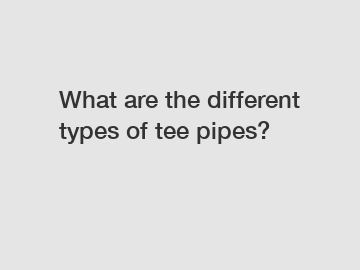What are the different types of tee pipes?
What are the different types of tee pipes?
Tee pipes are a crucial component in many plumbing and irrigation systems. They are commonly used to join three pipes or tubes together, forming a T-shaped junction. Tee pipes are available in various types, each suited for specific applications. Let's delve deeper into the different types of tee pipes and their uses.
1. Equal Tee:

An equal tee is the most common type of tee pipe. Its branch diameter matches the size of the run pipe, resulting in equal-sized openings for all three pipes. Equal tees are versatile and widely used in plumbing and heating systems, as well as in industrial applications. They allow for an even flow of fluid or gas, ensuring efficient distribution.
2. Reducing Tee:
A reducing tee, as the name suggests, has a branch diameter that is smaller than the run pipe's diameter. This type of tee is useful when joining pipes of varying sizes. Reducing tees allow for a smooth transition in pipe sizes while maintaining a T-shaped configuration. They find applications in situations where the flow rate needs to be controlled or redirected, such as in irrigation systems or industrial piping.
3. Barred Tee:
Barred tees are specifically designed for applications where a branch pipe needs to be redirected or connected to an existing pipeline. Unlike equal or reducing tees, barred tees have a plug or barrier within the branch pipe. This barrier prevents the flow from going straight through the branch, redirecting it instead. Barred tees are commonly used in oil and gas pipelines to divert flow for maintenance or repair purposes.
4. Welded Outlet Tee:
Welded outlet tees, also known as socket weld tee, are used when a branch pipe needs to be welded to the run pipe. These tees feature a socket weld connection, where the branch pipe can be easily joined by welding. This type of tee is commonly used in high-pressure or high-temperature applications, such as in the petrochemical industry or power plants.
5. Flanged Outlet Tee:
Flanged outlet tees are similar to welded outlet tees, but instead of a socket weld connection, they feature flanges that allow for a bolted connection. Flanged tees are widely used in applications where quick and easy assembly or disassembly is required. They are commonly found in infrastructure projects, water treatment plants, and refineries.
In conclusion, tee pipes come in various types to suit different plumbing and industrial needs. Equal tees are versatile and provide even flow distribution, while reducing tees enable pipe size transitions. Barred tees redirect flow for maintenance purposes, and welded and flanged outlet tees offer secure connections for high-pressure environments. It is essential to choose the appropriate tee pipe type based on the specific requirements of your application to ensure efficient and reliable operation.
Contact us to discuss your requirements of blind flange supplier, difference between bend and elbow, what is tee in plumbing. Our experienced sales team can help you identify the options that best suit your needs.


